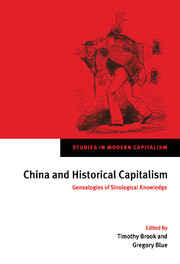Book contents
- Frontmatter
- Contents
- Preface
- Major dynastic periods in China's history
- 1 Introduction
- 2 The West, capitalism, and the modern world-system
- 3 China and Western social thought in the modern period
- 4 Capitalism and the writing of modern history in China
- 5 Towards a critical history of non-Western technology
- 6 The political economy of agrarian empire and its modern legacy
- Bibliography
- Index
Preface
Published online by Cambridge University Press: 22 September 2009
- Frontmatter
- Contents
- Preface
- Major dynastic periods in China's history
- 1 Introduction
- 2 The West, capitalism, and the modern world-system
- 3 China and Western social thought in the modern period
- 4 Capitalism and the writing of modern history in China
- 5 Towards a critical history of non-Western technology
- 6 The political economy of agrarian empire and its modern legacy
- Bibliography
- Index
Summary
This book has had its own long and complex history. The original idea of addressing the formation of European and Chinese interpretations of China in the light of the development of European capitalism we owe to Joseph Needham, who died in 1995 at the age of ninety-four. Needham stood out among Western scholars who have taken China seriously in the sense of using Chinese history to question assumptions about European and world history. He committed his work on the history of Chinese science and technology to the task of recognizing China's contributions to world scientific knowledge and scientific culture. Wanting to understand why Chinese science and technology had been comparatively advanced, only to be eclipsed by “modern” science in Europe after the sixteenth century, he set himself the task of historically reconstructing the Chinese scientific and technical traditions. During the Second World War he formulated his problematic in terms of the negative question of “why modern science had not developed in China but only in Europe,” but he soon expanded his inquiries with the more positive formulation of “why was Chinese civilization much more efficient than occidental in gaining natural knowledge and in applying it to practical human needs” prior to the sixteenth century. The difference between Chinese superiority until that time and European superiority thereafter Needham credited not to a difference in civilizational genius, as many of his generation and their predecessors had done, but to differences in the historical circumstances shaping the two societies.
- Type
- Chapter
- Information
- China and Historical CapitalismGenealogies of Sinological Knowledge, pp. ix - xiPublisher: Cambridge University PressPrint publication year: 1999

